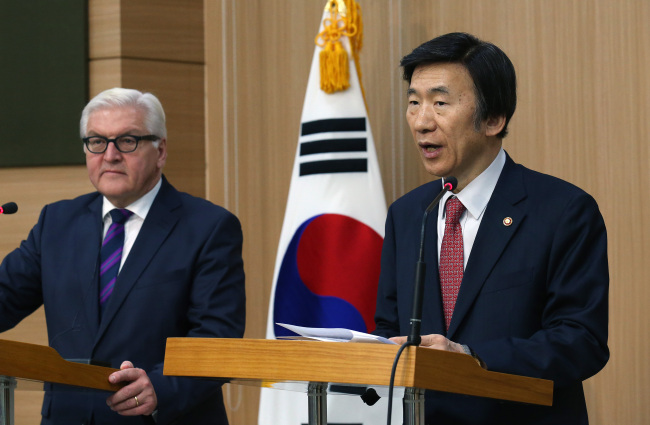The foreign ministers of South Korea and Germany pressed North Korea on Friday to give up its nuclear weapons development and engage in dialogue to bring peace on the Korean Peninsula.
“We shared views that it is important to attract North Korea to take the path of dialogue and cooperation,” said South Korean Foreign Minister Yun Byung-se at a joint news conference held in Seoul.
“To build sustainable peace on the Peninsula, North Korea should stop pursuing economic and nuclear weapons development at the same time,” he said.
Yun’s German counterpart Frank-Walter Steinmeiser stressed that Pyongyang’s nuclear program posed a grave threat to the region and beyond, and had made the communist regime increasingly isolated in the international community.

“I believe that the resistance from North Korea’s traditional allies on the (vision of) unification of the Korea Peninsula is not strong as it was before,” he said.
“My impression is that North Korea has become more isolated than before in regard to its policies,” he added.
The Germany’s top diplomat arrived in Seoul for a two-day visit to launch a joint advisory panel on unification and meet President Park Geun-hye.
The advisory panel was set up following a bilateral agreement reached in September to discuss current geopolitical issues on the Korean Peninsula and share Germany’s experience of unification, officials said.
South Korea and Germany agreed to create the 14-member panel to support Seoul’s efforts to learn from the unification of East and West Germany. This year, the European country is celebrating the 25th anniversary of the fall of the Berlin Wall.
In the meeting, officials from both countries were to study ways to seek support from neighboring countries during the unification process. Experts and officials say that East and West Germany were able to integrate smoothly through holding a series of successful negotiations with the countries involved. The negotiations, which became known as the “2+4 Talks,” involved the two Germanys and the four powers -- the U.S., France, the U.K. and the Soviet Union -- that had engaged in the postwar occupation of the European country.
South Korea and Germany have been accelerating joint efforts since Park’s visit to the East German town of Dresden in March.
Park unveiled her unification proposal, known as the Dresden Declaration, to expand humanitarian aid to North Korean people and build infrastructure there.
In a separate meeting at Cheong Wa Dae, President Park told the German diplomat that the two countries had formed “a unique connection,” noting that they both experienced the pain of national division and both went through rapid economic growth.
She also expressed hope that the bilateral ties could be developed further in various fields on the “solid” foundation that the two have built so far.
By Cho Chung-un and news reports (christory@heraldcorp.com)
-
Articles by Korea Herald











![[Hello India] Hyundai Motor vows to boost 'clean mobility' in India](http://res.heraldm.com/phpwas/restmb_idxmake.php?idx=644&simg=/content/image/2024/04/25/20240425050672_0.jpg&u=)








